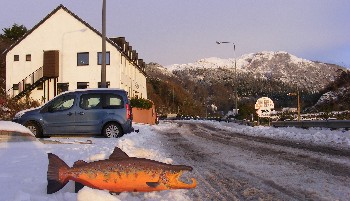WRFT update from Gairloch: New Year 2010
Posted: Tuesday 5 January, 2010 @ 15:54:19

We're almost snowed in: its been cold since mid-December, the unusual weather is said to be related to high pressure over the arctic rather than mid latitudes where it is more often located (see BBC News page for further information). An explanation for the 2009 glut in sandeels suggested by Marine Scotland scientists was that coastal sea tremperatures had been cooler than normal in the winter of 2008-9; that being the case, perhaps 2010 will be another good year for sandeeels, breeding sea birds, and sea trout . . .
Winter is time for writing up reports from the previous field season. The WRFT work programme for 2010 includes completion of a Biosecurity Plan for the WRFT area, a Fisheries Management Plan for the Little Gruinard (Atlantic Salmon SAC), and short reports presenting the main findings of last year's electro-fishing surveys. Please contact the WRFT biologist if you are particularly interested in any results! We'll also be investigating options for using GIS to analyses sea lice data from wild sea trout sampling, progressing the juvenile salmon Carrying Capacity Project in collaboration with Cromarty Firth Fisheries Trust; and on the eduction front, another series of Salmon in the Classroom projects at local Primary schools led by Dr Lorna Brown. A Herring rediscovery project is also underway . . . more about that shortly!
Proposals for other work in 2010 include the development of a GIS data base of all the lochs and lochans in the WRFT area combined with surveys to record presence and absence of trout and other fauna; anyone interested in an expedition to sample remote hill lochs please get in touch. Seminars have been pencilled into the diary as follows: a Stock Restoration seminar in May to focus on local restocking projects (and compliment the ASFB/RAFTS seminar in March) and a 'Managing Loch Maree: for wildlife, fisheries and people?' seminar in November in colaboration with other organisations.
To start the year, fisheries biologists from across the country gather near Pitlochry next week for the annual Scottish Fisheries Co-ordination Centre Biologist's meeting where we'll compare notes and review the ways we go about collecting and analysing fisheries data. Like other trusts around the country, the core part of Wester Ross Fisheries Trust's work is to collect good data based on sound science, to inform fisheries management. The SFCC provides training, guidance and much support.
It is now one year since the WRFT Fisheries Management Plan was completed: much was achieved in 2009 and we look forward to another busy and exciting year ahead. We are always delighted to hear from anyone who would like to support the work of the Trust, either by becoming a member, by making a donation or through in-kind help during the field season. Please contact the WRFT biologist for further information.
Happy New Year and Tight Lines!
Peter Cunningham, 5th January 2010